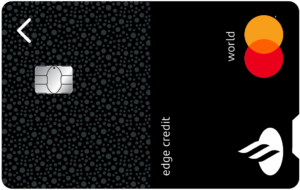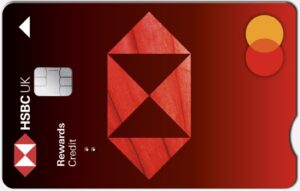 A cashback or reward credit card enables you to earn cashback or rewards as you spend. Every time you make a purchase on the card, you can earn rewards or cashback, or both. On this page you can find the key information you need to know about this type of credit card, as well as the very best offers currently available in the UK.
A cashback or reward credit card enables you to earn cashback or rewards as you spend. Every time you make a purchase on the card, you can earn rewards or cashback, or both. On this page you can find the key information you need to know about this type of credit card, as well as the very best offers currently available in the UK.
What is a cashback and rewards credit card and how does it work?
The rewards points or cash you earn on your credit card are generally paid as credit on your card balance or issued as vouchers. This can be done either monthly or annually.
Ideally, you would treat a reward or cashback credit card in the same way as you would a debit card, using it to purchase essentials, as well as your usual discretionary monthly spend. It's vital to make sure you pay off the balance in full each month to avoid paying interest on your spending, which could easily wipe out the rewards you earn.
If you're looking for a card to make new purchases (outside of your usual monthly spending), read our article 'Compare the best 0% purchase credit cards'. Alternatively, if you want to see our pick of the best of credit cards in the market, read 'Best credit cards in the UK'.
Find out which credit card is best for you
Comparing different credit cards is a key part of getting the best deal for you. Money to the Masses has helped to simplify this process by partnering with Creditec*, an online comparison service. You do not need to trawl through countless different provider websites hunting for the best cashback or lowest fees, as Creditec’s personalised search results will show you the key details you need to know in one place. Your tailored list will also feature the cards that you are more likely to be accepted for, cutting down the chance of any applications you make being rejected. Your search results are built using a soft credit search, so there will be no damage to your credit score. You can start your search by clicking this link*.
Which are the best cashback credit cards - January 2025
Having fully assessed the current market, here are our top cashback credit card picks, based on the cashback rate, fees, APR and other perks and benefits:
| Card name | Representative APR | Annual fee | Cashback rate | Cashback on annual spend of £5,000 in the first year |
|
American Express Cashback Everyday Credit Card |
30.7% variable | £0 | New cardmembers get 5% cashback on purchases (up to £125) for the first five months of Cardmembership.
Cashback rate falls to 0.5% after the five months end, then rises to 1% once you spend £10,000. Minimum annual spend of £3,000 to qualify for cashback. |
£118.74 (if you spent an equal amount every month) |
| Santander Edge Credit Card¹ | 29.8% variable | £36 (£3 per month) | 2% cashback (up to £15 a month) on all purchases for the first year. Ongoing rate of 1% cashback (up to £15 a month) after the first year. | £100 (if you spent an equal amount every month) |
|
American Express Platinum Cashback Credit Card |
36.3% variable | £25 | 5% (up to £125) in the first three months.
Ongoing rate of 0.75% up to £10,000 per year, 1.25% over £10,000. You'll need to spend a minimum of £3,000 per year in order to qualify for the cashback. |
£90.62 (if you spent an equal amount every month) |
| Santander All in One Credit Card - Check eligibility* | 29.8% variable | £36 (£3 per month) | 0.5% (the maximum cashback you can earn each month is £10) | £25 |
¹Only available to Santander current account customers
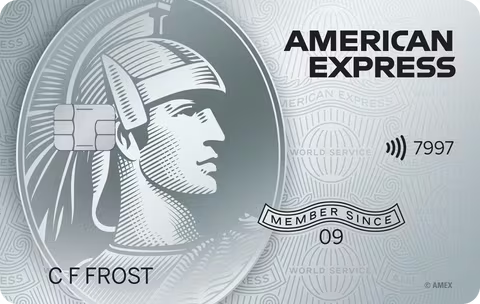
While American Express is the undisputed champion of both cashback and reward credit cards, offering the highest reward rates on the market, this card stands out because it doesn't levy an annual fee, unlike many other cards in the Amex range. It has a high initial cashback rate for the first five months, but continues to offer a market-beating rate after that.
There is no limit on the amount of cashback you can earn in a year and there is also the additional bonus of travel accident insurance and Global Assist, which provides round-the-clock support if you need help when you are abroad. American Express Experiences also gives cardholders priority access to concerts and other live events. You'll need to spend a minimum of £3,000 on the card per year in order to qualify for cashback and the introductory 5% period is only available if you have not held a personal American Express card within the previous 24 months.
When you spend £1,200 at a purchase rate of 30.7% (variable) p.a., your representative rate is 30.7% APR (variable). You can read more on the Amex site here.
For details on other American Express cards, read 'Which is the best American Express credit card?'.
Though only available to Santander current account customers, the Edge credit card currently offers the most consistently high level of cashback in the UK. The headline rate of 2% for the first year, falling to 1% in the second year, is below the starting rate of its Amex competitors, but things even out over the course of a year.
There is a monthly fee of £3 to pay, which will eat into the value of the card. There is also a £15 per month cap on the cashback, which equates to £180 per year. You would need to be spending £750 per month in the first year and £375 per month in the second year to hit the cashback cap.

Those likely to spend £10,000 or more per year on a cashback credit card are likely to benefit from the higher cashback rewards offered on this American Express credit card. The card pays 0.75% cashback on up to £10,000 spending per year and 1.25% cashback on spending over £10,000.
There is no limit on the amount of cashback you can earn in a year and there is also the additional bonus of travel accident insurance and Global Assist, which provides round-the-clock support if you need help when you are abroad. American Express Experiences also gives cardholders priority access to concerts and other live events. You'll need to spend a minimum of £3,000 on the card per year in order to qualify for cashback. This card charges a £25 annual fee.
When you spend £1,200 at a purchase rate of 30.7% (variable) p.a. with a fee of £25 per annum, your representative rate is 36.3% APR (variable). You can read more on the Amex site here.
For details on other American Express cards, read 'Which is the best American Express credit card?'.
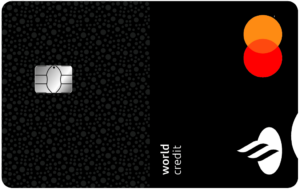
The Santander All in One card often appears on best credit card round-ups because of the fact it offers 15 months interest-free on balance transfers and 15 months on purchases. However, it is also worth considering if you are looking to earn cashback as it provides a good standard rate, as well as the potential to earn extra cashback with selected retailers. On top of that, it also has no foreign transaction fees on purchases in local currency for those travelling abroad.
The downside with this card is it does attract a £36 annual fee and the maximum cashback you can earn each month is £10. However, if you are planning to make use of the balance transfer deal, the fact there is no balance-transfer fee, coupled with the savings you will make by moving over any existing debt, soon justifies the cost of having the card.
When you spend £1,200 at a purchase rate of 23.9% (variable) p.a. with a fee of £36 per annum, your representative rate is 29.8% APR (variable). You can read more on the Santander site here.
You can read our full review of the Santander All in One credit card here.
Which are the best rewards credit cards - January 2025
If you are looking to just earn air miles through your rewards credit card, check out our 'Which are the best air miles credit cards – and should I get one?' page.
Here are our top 3 rewards cards offering a range of different points:
| Card name | APR | Annual fee | Rewards rate | What is reward worth? |
|
American Express Preferred Rewards Gold Credit Card |
88.3% | £195 (£0 in first year) | 1 point for every £1 spent, 2 points for airline and foreign currency purchases.
20,000 membership rewards points when you spend £3,000 in your first three months. |
1 point = 0.5p for shopping vouchers
1 point = 1 Avios Air miles/hotel point values vary |
|
John Lewis Partnership Credit Card - Check eligibility |
28.9% | £0 | 5 points for every £4 spent at John Lewis and Waitrose and 1 point for every £4 spent elsewhere, doubled for the first 60 days.
Get £40 in vouchers to use in John Lewis and Waitrose if you are a new customer and open a Partnership Credit Card in store or on the John Lewis website by 6 January 2025, then spend a minimum of £250 on eligible purchases at John Lewis and Waitrose within 90 days |
500 points = a £5 voucher |
| HSBC Rewards Credit Card | 23.9% | £0 | 1 point for every £5 spent on your card
Get 2,500 welcome points worth £25 when you make your first transaction on the card |
100 points = £1 |
| Amazon Barclaycard Credit Card - Check eligibility | 28.9% | £0 | 1% 'cashback' (paid in Amazon rewards that can be exchanged for gift cards) on Amazon, Audible, Kindle and Prime Video spending; 0.5% cashback on non-Amazon spending in the first year, then 0.25%; 2% cashback for Prime members during special shopping events, such as Prime Day or Black Friday. £5 in Amazon rewards can exchanged for a £5 gift card
Get a £20 Amazon Gift Card if your application is approved |
£1 in Amazon rewards cashback = £1 in Amazon vouchers |
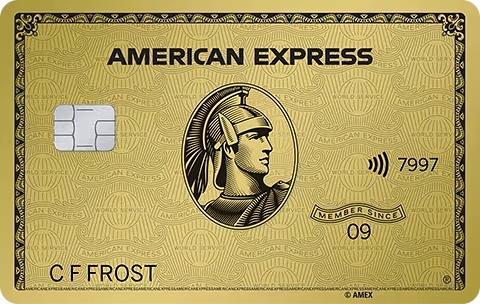
As previously stated, there are a range of very attractive rewards and cashback cards from American Express, as detailed in our round-up of the best American Express cards. However, this card stands out because of the sheer flexibility of how you can "spend" you rewards points. This includes using the points with 12 airline loyalty programmes, including British Airways Executive Club, Emirates Skywards and Virgin Atlantic Flying Club. You can also opt to pay with your rewards points with selected retailers, including Amazon and Ticketmaster. Added to that, you get two complimentary airport lounge visits per year, as well as getting £5 back on Deliveroo orders twice per month.
However, the card does have a relatively high annual fee after the first year and you will have to spend a minimum of £3,000 in the first three months to unlock the 20,000 Membership Points bonus. You can read more on the Amex site here.
When you spend £1,200 at a purchase rate of 30.7% (variable) p.a. with a fee of Year 1 - £0, Year 2 onwards - £195 per annum, your representative rate is 88.3% APR (variable).
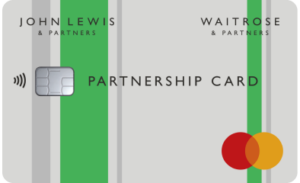
The John Lewis Partnership card offers 5 points for every £4 spent on eligible purchases at John Lewis and Waitrose and 1 point for every £4 spent elsewhere, though this will be doubled for the first 60 days. Once your earn 500 points, you will be sent a £5 voucher. On top of the rewards, you can benefit from 0% interest on all your purchases for the first six months and £40 in vouchers when you open a Partnership Credit Card online or in a John Lewis store by 6 January 2025 then spend a minimum of £250 on eligible purchases at John Lewis and Waitrose within 45 days of opening your account. You can read more on the John Lewis site here.
The HSBC Rewards card is appealing not only because of the potential it offers to earn rewards over the long term, but also the attractive sign-up bonus it has, as well as giving a further bonus if you spend £10,000 or more on the card over a year. There is also a great deal of flexibility in how you can use the rewards, with the Pay with Rewards allowing you to redeem your points against any purchases you make on the card. Additionally, you can pay 0% interest on purchases and balance transfers for up to 6 months.
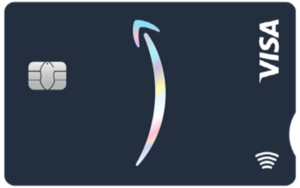
The headline 'cashback' is actually paid as Amazon rewards points rather than cash. Once a user earns at least £5 in rewards points, they can be exchanged for a £5 Amazon gift card. At the time of writing, only new Barclaycard customers can apply for the Amazon card and existing customers will not be able to switch over.
How to make the most of your cashback or reward credit card
When you are considering which is the best cashback or reward credit card for you, you will need to weigh up the features it offers, including:
Reward/cashback deal
You need to choose a card that fits in with your normal spending habits to make the most of the rewards or cashback it offers. For example, if there is a minimum annual spend required, you need to assess whether it is realistic you are going to meet it. In addition, you need to balance any initial introductory offer with the long-term benefits it offers - while 3% cashback for 3 months may seem attractive, it is not as good as 1% cashback for 12 months.
As previously mentioned, you should also compare the relative value of the reward on offer, as well as making sure you are going to make maximum use out of the card.
Annual fee
The most competitive cards in the market with the highest cashback or rewards can often have a high annual fee. You need to assess how much you are likely to earn on the card in cashback or rewards and see if it justifies paying the fee. At the same time, there are a number of fee-free options that still offer good levels of rewards, so if you are not sure how much you are likely to use the card and don't want to risk having to pay out a high annual fee, this may be a better option for you.
Interest rate
The representative APR on cashback and reward credit cards tends to be higher than for other types of cards. The best way to avoid this being an issue is to ensure you pay off the full balance each month as this means you won't have to pay any interest at all. It is wise, however, to take into account the APR on the card you choose just in case you do end up carrying over some of the balance because of an unexpected change in circumstances later down the line.
Additional perks
As well as the reward or cashback on offer, these cards can sometimes provide other benefits, including discounted tickets to live events, free travel insurance, no foreign usage fees or airport lounge access. Again, it is necessary to work out whether you are likely to make full use of these perks and how they fit in with the other features of the card. Depending on how you use it, it may be better to have a higher overall cashback rate, for example, rather than the ability to access exclusive tickets to concerts and shows.
Things to consider before getting a cashback or reward credit card
Always consider your financial circumstances before applying for any credit card. Getting caught up in the excitement of cashback deals and rewards can sometimes cloud your judgement and leave you struggling to clear the credit card balance, especially as cashback credit cards tend to charge higher interest than other cards.
It is absolutely vital that you clear the outstanding debt each month to ensure you use the card to its full potential. The advertised cashback rewards and bonuses are often subject to your own personal circumstances and so be prepared to either be rejected or offered alternative terms if your finances are not in good shape.
All applications are subject to credit checks so make sure you know your chances of being accepted before you apply. Most companies will allow you to check your eligibility before you apply, resulting in a 'soft search' that doesn't impact your credit score.
Pros and cons of a cashback and reward credit card
Pros of a cashback and reward credit card
- You can earn rewards or cashback on the normal spending you would be doing anyway, if you pay the balance in full each month and don't overspend
- You can choose a card to match your interests, such as an air miles card for a frequent traveler
- As with all credit cards, you will benefit from section 75 protection
- Some cards offer other perks in addition to the cashback or rewards, such as 0% spending or interest-free balance periods
- You may be able to access retailer discounts or priority access to tickets for gigs and events
Cons of a cashback and reward credit card
- You may not be able to redeem your rewards points exactly how you want to, for example rewards flights are not always available on every route
- You may need to pay an annual fee
- Rewards cards give you less flexibility over how you can make use of your rewards, compared to cashback
- the promise of cashback or rewards points can encourage cardholders to spend over and above what they normally would, especially if there is a certain level of spending required to unlock bonus points
- These cards usually come with a higher APR than alternative credit cards
- Your rate of cashback or the amount of points you can earn per pound spent can be cut with little notice
Alternatives to a cashback or reward credit card
It can be simpler to use a debit card for purchases as it ensures that you only ever spend the money you have, and, subject to overdraft charges, means you won't be charged. You can also find debit cards offering very competitive levels of cashback. If you are looking to spread the cost of a purchase or make a balance transfer, it may be worthwhile forgoing rewards to get the best 0% interest period possible.
If a link has an * beside it this means that it is an affiliated link. If you go via the link, Money to the Masses may receive a small fee which helps keep Money to the Masses free to use.



